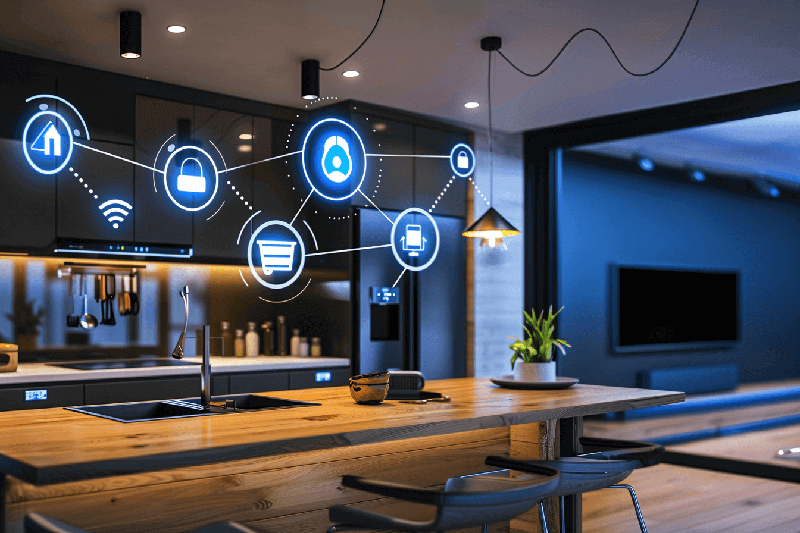The Unseen Risks of Smart Home Devices: Are Our Homes Spying on Us?
The allure of smart home technology is undeniable. With voice-activated assistants, smart thermostats, security cameras, and smart lights, the convenience of controlling everything with a simple voice command or through an app on a phone is appealing.
However, as smart home devices become more integrated into our daily lives, concerns about privacy and security can’t be ignored. Are these gadgets spying on us?
Smart home devices are designed to make life easier, but they also collect vast amounts of data about our daily routines. Voice assistants like Alexa and Google Home are always listening for their wake words.
This means they are constantly processing ambient sounds, and while manufacturers assure us that this data is only stored after the wake word is detected, incidents like the Alexa eavesdropping scandal make it hard to trust these assurances completely.
Smart security cameras, intended to keep homes safe, can also pose significant privacy risks. Many of these devices offer cloud storage options, meaning footage is stored on remote servers.
This raises concerns about who has access to this data and how secure these servers are.
There have been instances where security camera feeds were hacked and live-streamed, exposing intimate details of people’s lives.
Hidden Dangers in Everyday Convenience
Controlling the home environment through a single app is incredibly tempting.

From adjusting the thermostat while away to checking who’s at the door from the office, smart home devices offer unparalleled ease of use. However, this convenience comes with significant trade-offs.
One of the most concerning aspects is the potential for data breaches.
Smart home devices often require users to create accounts and connect to the internet, making them vulnerable to cyber-attacks.
In 2019, a massive breach exposed the data of millions of users of a popular smart home platform, highlighting the vulnerability of connected homes. More details about this breach can be found in this TechCrunch article.
Privacy Trade-Offs and Surveillance
Every device connected to the internet is a potential entry point for hackers.
Many smart home devices have weak security measures, making it easy for cybercriminals to gain access to home networks.
Once inside, they can exploit other connected devices, steal personal information, or even hijack smart homes to carry out attacks on other networks.
It’s not just hackers that pose a threat. There are concerns about the data collected by these devices being used for surveillance by manufacturers and third parties.
The data collected can include everything from daily habits to personal conversations. This data can be used to create detailed profiles, which can then be sold to advertisers or, worse, fall into the hands of malicious actors.
Legal and Ethical Concerns
The ethical implications of smart home technology are significant. In some jurisdictions, law enforcement agencies have requested access to data collected by smart home devices to assist in criminal investigations.
While this can be seen as a positive use of the technology, it also raises questions about privacy and the potential for misuse.
For example, in 2018, it was reported that Amazon had received hundreds of demands from law enforcement for data collected by Echo devices.
This trend of increasing surveillance is concerning, as it blurs the line between public safety and personal privacy.
You can read more about these concerns in this New York Times article.
Taking Control of Your Privacy
There are several steps that can be taken to protect privacy while enjoying the benefits of smart home technology:
Use Strong Passwords: Ensure all smart home devices are secured with strong, unique passwords. Avoid using default settings.
Regular Updates: Keep devices’ firmware up to date. Manufacturers release updates to patch vulnerabilities, so staying current is essential.
Secure Your Network: Use a strong, unique password for Wi-Fi networks and consider setting up a separate network for smart home devices.
Be Selective: Research the security features of a product before purchasing and avoid those with a poor track record.
Limit Data Sharing: Be mindful of the data shared with smart home devices. Disable features that are not used and regularly review privacy settings.
Beyond the Basics: Advanced Security Measures
For those particularly concerned about privacy, additional steps can be taken.
Consider using a Virtual Private Network (VPN) for the home network to encrypt internet traffic, making it more difficult for hackers to intercept data.
Hardware firewalls add an extra layer of security to home networks.
Some advanced users opt to set up their own local servers for smart home devices, ensuring data is stored locally rather than in the cloud.
This can be more complex and time-consuming but offers a higher degree of control over data.
Conclusion
While smart home devices offer incredible convenience, they also bring significant privacy risks. Staying informed and taking proactive steps can help protect homes and data.
The allure of a smart, connected home is strong, but vigilance is necessary to ensure homes do not become a haven for digital intruders.
For more information on protecting smart homes, check out this comprehensive guide from Consumer Reports.
By implementing these tips and staying aware of the potential risks, the benefits of smart home technology can be enjoyed without sacrificing privacy and security.

